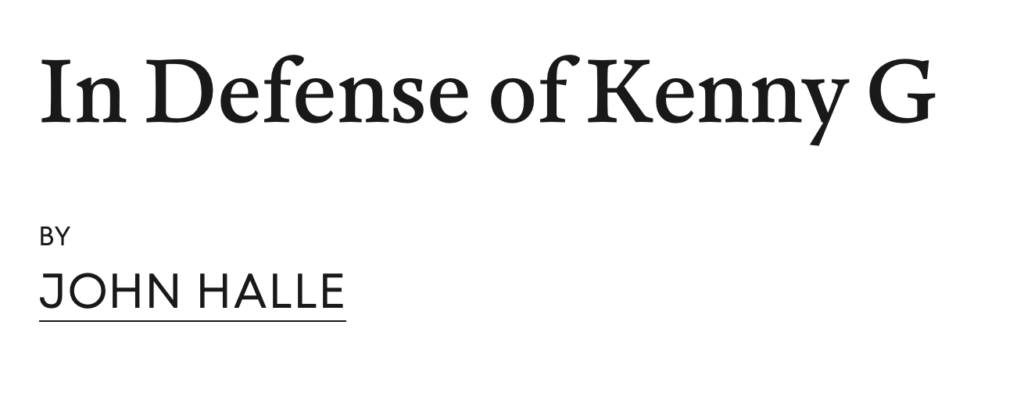A Land Beyond Self-Parody

Jacobin merged with the contrarian-hawt-take era of Slate so seamlessly I didn’t even notice:

Feel free to eat the poison mangoes if you like, but I can assure you that this argument is every bit as baldly stupid as it sounds on its face:
Music has for centuries functioned to reinforce social hierarchies and define the boundaries of elite class identity. Those exhibiting musical talent in the approved “high” genres have been able to transcend their economic status, gaining access to elite circles, as have those who have shown a full assimilation and deep understanding of the aesthetic and social norms associated with the high arts. Conversely, demonstrating an excessively non-ironic affinity for “low” musical genres and cultural products, however these are defined, is a recipe for exclusion from them.
It is in this sense that a preference for Kenny G, as suggested above, “invites social ostracism” by elites and by the professional managerial classes (PMC) that serve them.
This is all the most laughable “hello fellow working class kids” horseshit imaginable. In fairness to Slate, at least Creed had within a decade of the the publication of its contrarian clickbait been a genuine pop culture phenomenon (as the article notes, they made more than $70 million touring and sold upwards of 30 million records.) Kenny G is a dimly remembered former lazy punchline of zero cultural relevance. The piece starts not with a concert anybody paid to see — he doesn’t even have a permanent Vegas residence like Donnie and Marie — but with a gracious impromptu charity performance before a captive audience on an airplane that somebody on Twitter made the obligatory rote joke about. The idea that the typical working-class person puts on some Kenny G after a day at work is as absurd as the idea that anybody risks “ostracism” from the “professional managerial classes” if they did listen to him. This is like publishing an article claiming that Trump won because the PEE EM CEE disdains the novels of Harold Robbins or the dinner theater plays of Bob Crane, both of which I would expect by the end of the month.
And yet, it might not be the worst cultural criticism Jacobin has published this week:
Walk into almost any bookstore today and you’ll find an aisle dedicated to a peculiar hybrid — the graphic novel. Combining fantasy with fine art, highbrow concepts with lowbrow caricature, graphic novels are neither literary novels, nor do they necessarily contain any graphic content. While they sometimes rival their literary forebears for length and seriousness, many of them don’t even tell fictional stories — take the example of Art Spiegelman’s Holocaust memoir Maus or Alison Bechdel’s Fun Home. Put simply, graphic novels are comic books — or, more precisely, ‘what comics have become in an age of gentrification.
[…]
Nonetheless, nostalgia for the good old times of superhero, horror, and adventure comics should be avoided — indeed, it is nostalgia that animates gentrification in the first place. In truth, a good deal of comics production throughout the twentieth century was instantly forgettable, frequently sexist, and sometimes outright racist. Yet, despite their shortcomings, serial comics often gave expression to working-class concerns: a dogged depiction of unequal and unending power struggles and an anarchic subversion of everyday life.
In contrast, scholars of the graphic novel tend to celebrate the graphic memoir, a subgenre that accords with their own middle-class values. Then again, the obsession with personal identity and a constitutive blindness to the issue of class have long been hallmarks of gentrification, whether in graphic novels or in the neighborhoods in which they are most often read.
The idea that “comic books” generally represented “working class concerns” while “graphic novels” are mostly middlebrow memoirs is too silly to merit further engagement. But what’s amazing is someone taking to the pages of Jacobin to declare that something written by and for bourgeois white people in gentrified neighborhoods in a few expensive urban enclaves is inherently worthless. When they open the Hall of Fame of Lack of Self-Awareness that will go in on the first ballot.


